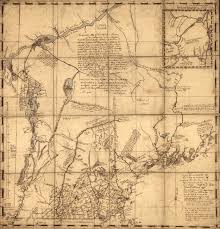 |
| map of New Hampshire |
Francis Rand was one of the brave souls who left England to help Captain John Mason establish a plantation in the wilds of New Hampshire in 1631. Francis settled in what was then called Sandy Beach, eventually to be known as the town of Rye, New Hampshire. He married Christian Unknown by 1645 and together they had at least six children. It is not known from where in England Francis originated or anything about his wife other than her given name.
Francis' name appears in the earliest town records for Portsmouth, of which Sandy Beach (Rye) was then a part. His name is first found on 5 April 1652. He was one of 21 listed as Townsmen. At that meeting in April 1652 it was laid down that he would lay the land for the men at Sandy Beach. Those men were William Berry, Anthony Brackett, Thomas Seavy, Francis Rand and James Johnson. The Portsmouth records only cover about 10 years and hey mostly have to do with the distribution of land, Francis' name and his land are found in those records.
Francis and Christian also appear in the Court Papers for New Hampshire. In 1640
he was involved in a court case along with others charged with
trespass. In 1648, Francis and Christian were in Court in Dover to testify in the adultery case of Anne Crowther and Henry Taylor. In 1649
Henry was sworn in for one years' term as constable of Upper Strawberry Bank. In 1650 in he was a witness in a case in which a man was drunk and swearing at him while he was acting as Constable. Christian
was brought to court and accused of slander by Walter Abbott in 1655, the court ruled in favor of Walter and
she was fined. Francis was on the Grand Jury in 1656, 1667 and in 1677
he was called to the Grand Jury but failed to show for which
he was fined.
At the court held June 1668 Francis Sr. made an unusual request that the court "please to free his son Francis Rand Jr. from common training by
reason of a grief that is upon him". The court granted this request for
a time period of three years, "supposing that in that time he would grow out of his distemper". This same court had Francis before them for drinking to excess the year before, for which
he was fined. In June 1674
Francis was presented for again drinking to excess but also for beating his wife. In reading the court records this seems to have been a fairly common offense committed by the men of New Hampshire. In June 1679 he
was presented for being drunk on the Sabbath and once again fined.
In 1689 Francis wrote his will. He included his children: Thomas, Samuel, John, Sarah (Herrick), (Mary Barnes) and Nathaniel.
Most of the land was divided between Thomas and Samuel. John was to
be given money paid by Thomas and Samuel.
Mary and Sarah were also given land which they later sold to their brother Thomas. The brothers were to care for their mother Christian.
Nathaniel was given 5 shillings. Francis Jr.
was not named and was presumably dead. John Rand was living at Oyster River by this time on land given to him by his father-in-law
John Ault. Nathaniel
was certainly slighted in the will, the reason for which we will never know.

On the last Tuesday of September in the year 1691 about 40
or so Indians landed their canoes on Sandy Beach. Avoiding the Garrison they attacked the settlers. Killed were Francis and
Christian Rand as well as their son Nathaniel. Their neighbor, Anthony Brackett,
was also killed along with many others.
Some children were taken captive and sent to Canada. I knew this attack as the Brackett Lane Massacre. Francis' will
was proved on February 19, 1691/2.
Like many of my ancestors, I don't think I would have liked Francis and possibly even Christian, and I doubt they would like me very much either. It's disappointing to find that your ancestors is a drunk and a wife beater, but it was a
vastly different time, life was
incredibly hard and living under the constant threat of death from Indians would probably drive
a lot of people to drink.
Sources:
The Pioneers of Maine and New Hampshire, 1623 to 1660, By Charles Henry Pope
New Hampshire State Papers,
Vol 40
History of Rye, New Hampshire, Landon Brown Parsons, 1906
Capt. John Mason, The Founder of New Hampshire, John Ward Dean, Boston 1887
History of the Town of Durham
Vol 1, Everett Stackpole
.




No comments:
Post a Comment